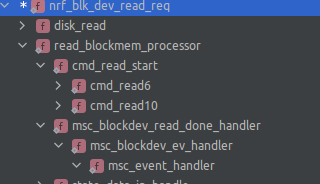Hello,
I'm using SDK nrf5_17.0.2 on nrf52840
I'm implementing a custom nrf block device for a spi nand flash, and I'm getting trouble with the calling site of the nrf_blk_dev_read_req call from the usb msc (app_usbd_msc).
nrf_blk_dev_read_req could be called either by app_usbd_msc.c::cmd_read_start or by app_usbd_msc.c:msc::msc_blockdev_ev_handler as shown in the following screenshot:

The call stack from the cmd_read_start is "the normal path" and this path works. The callstack from the msc_blockdev_ev_handler comes from my block device where I have to notify the usb msc stack the status of the block device request (for the example at the end of the read request):
const nrf_block_dev_event_t ev = {
.ev_type = NRF_BLOCK_DEV_EVT_BLK_READ_DONE,
.result = NRF_BLOCK_DEV_RESULT_SUCCESS,
.p_context = p_work->p_context,
.p_blk_req = p_blk,
};
p_work->ev_handler(p_blk_dev, &ev);
The problem is in the ev_handler (pointing to msc_blockdev_ev_handler) implementation where the _BLK_READ_DONE command is handled like the following:
case NRF_BLOCK_DEV_EVT_BLK_READ_DONE: CRITICAL_REGION_ENTER(); msc_blockdev_read_done_handler(p_blk_dev, p_event); CRITICAL_REGION_EXIT(); break;
msc_blockdev_read_done_handler is called in a critical region. So following the call stack from this point leads to app_usbd_msc.c::read_block_mem_processor:L950 where nrf_blk_dev_read_req is called if there is still some bytes to process.
The problem is that I currently reading page size (4096 bytes) in the external memory by SPI in a asynchronous way so I'm using SPIM with EasyDMA. And the SPI irq is never called because NVIC->ICER has been clear in CRITICAL_REGION_ENTER.
Why msc_blockdev_read_done_handler has to be called in a critical region ? How can I fix this issue ?
Best
Joël


